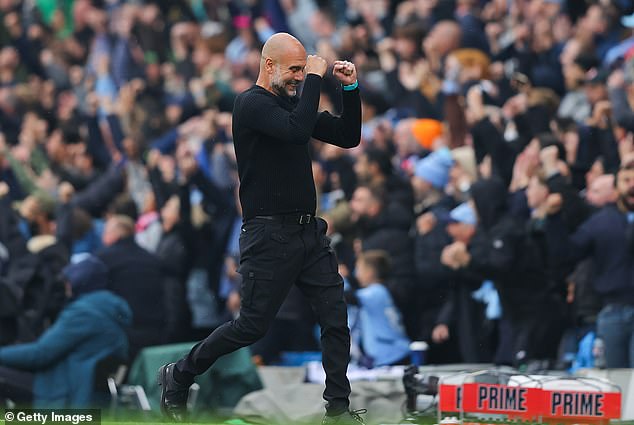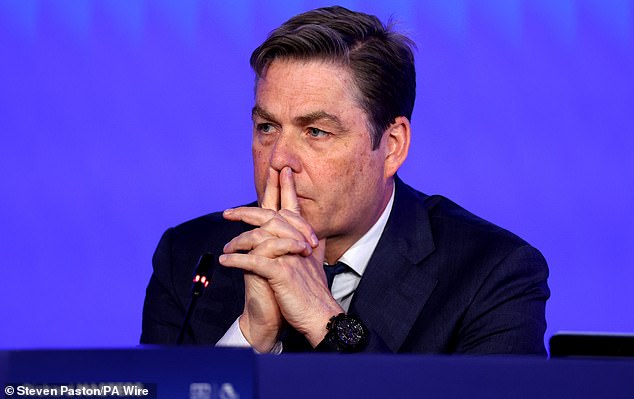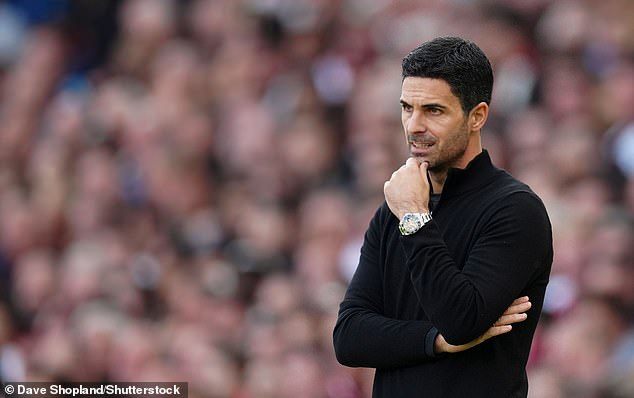Manchester City DEFEAT the Premier League in legal challenge over rules about ‘inflated’ sponsor deals from companies linked to their owners – which threatens to blow up football’s financial regulations
Manchester City today secured a historic legal victory against the Premier League after judges ruled that some of the league’s sponsorship rules are unlawful.
The regulations on Associated Party Transactions (APTs) are intended to prevent companies linked to the owners of football clubs from deliberately paying the odds on deals with the clubs themselves.
The rules were introduced following the Saudi takeover of Newcastle United in an attempt to stop wealthy owners from using these connections to boost their teams’ revenues so they can spend more money without breaking financial fair play rules.
In City’s case, the rules led to the Premier League rejecting a new one sponsorship deal the club signed with Etihad at the end of 2023, as well as a second deal with an Abu Dhabi-based bank.
A panel of three retired judges has now ruled that the league was wrong to halt the deals because elements of the ATP regulations breach the Competition Act.
The decision will send shockwaves through English football and is seen as a major blow to Premier League chief executive Richard Masters as it will change the direction of the league’s future financial governance.
It could even influence future results by making it easier for clubs with super-rich owners to secure lucrative sponsorship deals, and making it easier to buy and sell players between clubs with the same owners.
Man City has won the legal battle against Premier League sponsorship rules

Pep Guardiola’s team took legal action against these sanctions in February, which they considered a form of ‘discrimination’.
City, which is owned by a company linked to Abu Dhabi’s ruling family, currently is facing 115 charges for breaching Premier League financial rules in a separate lawsuit.
The club took the league to court earlier this year, claiming APTs were unfair.
In a statement today, City said: ‘Manchester City Football Club thanks the distinguished members of the Arbitral Tribunal for their work and considerations and welcomes their findings.’
In a statement of no fewer than 1,248 words, the Premier League said it “welcomed” the panel’s findings, “which endorsed the overall objectives, framework and decision-making of the APT system.”
It added: ‘However, the tribunal has identified a small number of individual elements of the rules which in their current form do not meet the requirements of competition law and public law. These elements can be addressed quickly and effectively by the league and clubs.”
The statement added that the APT system would continue to operate “taking into account the tribunal’s findings.”
The city had argued that such payments were unfair and not at market value because they often required little or no interest to be paid or not required to be repaid at all. If commercial rates are applied now – and the loans are included in the club’s profit and sustainability accounts – many could find themselves falling foul of financial regulations, which could be a nightmare scenario that puts pressure on Premier League bosses would increase.
The verdict could also open the door for City and others to sign significantly higher related party deals.
The surprising findings, seen by Mail Sport, were handed to clubs in a 175-page report this afternoon. It remains to be seen what happens next.
City are expected to seek costs and damages, while the Premier League is expected to have to overhaul or dump the system entirely. Other clubs can also claim compensation if they believe they have been affected.
The panel ruled that the league was wrong to reject, under ATP rules, an extensive new sponsorship deal City signed with Etihad late last year. City’s previous 10-year deal with the Abu Dhabi-based airline plays a major role in the separate case over the 115 charges.
Stopping a new deal with an Abu Dhabi-based bank was also deemed procedurally unfair.
City’s expensively assembled legal team led by Lord Pannick, the QC who led City’s defense against the 115, launched a series of claims against the APT rules, many of which focused on the element that deals had to represent what the league considered Fair Market Value (FMV) considered. ). They claimed that rules were intended to end their empire and were the result of a ‘tyranny of the majority’.
Although many of their claims were rejected, they won victories on no fewer than seven major arguments. City only had to show that the rules were illegal for one reason.

The Premier League will have to adjust the system as a result of the verdict or dump it completely (CEO Richard Masters in the photo)

The panel found that the rules ‘by object’ breached competition law, a serious and devastating breach.
Although the APT rules were only introduced after the 115 charges period, the panel’s findings could well cause panic among City’s rivals across the league as concerns have already been raised about costs.
Within the ruling it also emerged that Arsenal, Manchester United, Liverpool and West Ham gave evidence in favor of the Premier League, along with Brentford, Bournemouth, Fulham and Wolves.
The panel consisted of Sir Nigel Teare, a retired Supreme Court judge; Christopher Vajda KC, a former judge of the European Court of Justice, and Lord Dyson, a former Supreme Court judge, also found the rules unlawful because clubs could not comment on details of other deals that the Premier League relied on before determining whether a deal was at fair market value.
Etihad’s ruling was ‘procedurally unfair’ and ‘must be set aside’ as City did not have the opportunity to respond to the Premier League’s analysis before reaching its decision. The deal with First Abu Dhabi was also unfair as City was not given details of transactions with other clubs referred to by the Premier League in its final decision and there was an ‘unreasonable delay’ of around three months.
One of their arguments was that City owed the changes to ‘fear-mongering’ after the Saudi takeover of Newcastle. They had also claimed the rules specifically targeted Golf-owned clubs, citing an email from one club on behalf of a total of 11 clubs, but the panel ruled this was not the case.
The panel also made a number of findings in support of the amendments, with the ex-judges pointing out that there was ‘sufficient evidentiary basis for the Premier League to conclude… that the (old) rules were ineffective in controlling APTs ‘.

Several clubs, including perennial rivals Arsenal, Manchester United and Liverpool, have testified in favor of the Premier League
They rejected many of City’s five claims, stating that Fair Market Value (FMV), while ‘not an exact science’, was an ‘inherent’ part of profit and sustainability rules and that there was no price fixing or unclear criteria. But that will be of little comfort to the league or City’s rivals.
Last week, Mail Sport reported how the last-minute withdrawal of a proposed APT rules change was removed from the agenda of a Premier League meeting, which was interpreted as a clear indication of which way things had gone.
The Premier League’s case against City over 115 alleged breaches of financial rules is now entering its third week of an expected 10. If the club is found guilty, this could lead to high fines or even relegation for Pep Guardiola’s team.
While there may not be an immediate impact, city officials have given the competition a bloody nose and are no doubt hoping the ruling sets a clear precedent.
